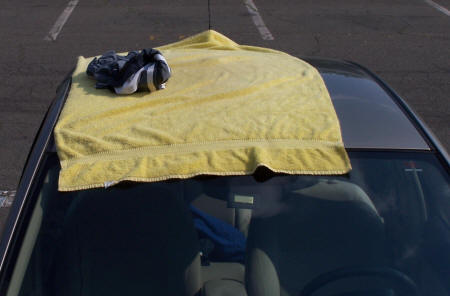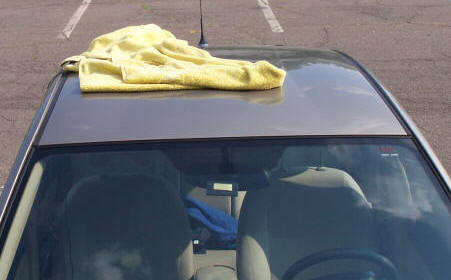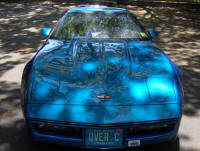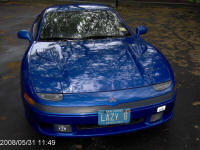RIKLBLOG
|
| Tomorrow |
| 17 July 2008 |
| Yesterday |
| Index |
| Eventide |
| SETI League |
| PriUPS Project |
| Bonus! |
| Contact |


The Magnetowel
I'm not good at cloth. Long ago, when the parental units were responsible for my wardrobe, they despaired at my cavalier attitude toward the integrity of items they purchased for me. To me, a soldering iron burn was a badge of ambition; to them it was a soldering iron burn. Apparently appearing in public with that, or chemical stains, or <gasp>wrinkles</gasp> was somehow anathematic and reflected poorly on them.
This is no longer an issue. Apparently I reflect poorly only on myself now, although I try to heed the occasional request to "Please at least wear a shirt with a collar - we're going to a funeral." I bring this up because my latest invention involves an item made of cloth.
Riddle: What gets wetter and wetter the
more it dries?
Answer: A towel
Clearly my sense of humor hasn't improved much over the ages either. But, yes, the item in question is a towel. Made famous by The Hitchhiker's Guide to the Galaxy, the lowly towel has a supremely practical use: It absorbs water from human skin after said skin has been immersed in water. I and my socks are thankful for this characteristic. The towel is a great timesaving device since one would otherwise have to wait, "dripping wet," for the water to evaporate. I imagine that this lowly cloth appliance saves months of an average, relatively clean person's life.
A battery, after performing however many Watt-hours of work must be recharged. The towel, whose work is, in effect, becoming charged by absorption of water, must be "de-charged." This can be done quickly or slowly. "Quickly" has advantages: Towel-resident microbes are deprived of nourishment more quickly and thus the towel remains the same color and exudes less aroma. "Slowly" has advantages as well: You can sort of roll it into a ball, throw it into the back seat of your car, and forget about it 'til you go to gym the following day. This saves the energy required to dry it and the effort of folding it. You can assume that I'm a proponent of method two, which has "forget about" and "saves the energy" as inherent aspects. And yet...
The advantages of quick drying are also manifest, and I decided to try an experiment one sunny, calm afternoon. When I got to work after leaving the gym, I spread the towel on the roof of the car. No energy cost (the sun doesn't have a coin slot) and, as an extra added plus, the UV rays might reduce the microbial encrustation. (It might also cause mutations, whose results are best not contemplated.)
 |
This is what my makeshift drying arrangement looked like. The excrescence on the left rear is a swimsuit. |
 |
This is what my makeshift drying arrangement looked like
after a losing bout with Nature manifested by her attribute of The Wind.
So much for my "calm afternoon" observation.
|
So what's the invention already?
Anticlimax. Just "sew" small magnets into the corners of a towel and it will repose comfortably and flatly on a metallic car roof. If you drive a convertible, you will need four bald guys with plates in their heads to sit still for a few hours. I have not tried this (either, actually) because "sew" is a "cloth" verb and hence a skill with which I have little personal familiarity. I'm convinced it will work.
Saving Gas With Your iPhone 3G
Some time ago I wrote about using your GPS to save gas. As wonderful as this idea is, it is difficult to implement routinely because it requires a GPS that displays precise time and some mental calculation. Apple's new iPhone has GPS capability, and I understand there's an SDK (software development kit) available that allows you to write programs for the phone. Presumably it also allows you to access the precise GPS time. Since you are likely to have your iPhone with you when you drive, it should be easy for someone to write a program to access GPS time and pop up a message on the screen telling you exactly what speed you must drive to hit the next traffic light when it's green. Your initial job would be to input info on the light's timing, most likely just by pressing a "red" or "green" button on the touchscreen enough times for the program to determine its cycle. Whoever writes this program will be a hero, since gas saving is all the rage today!
Q: Richard, why don't you do it?
A: Good Q:! Because for me the iPhone is
fatally flawed. Once again the "thin" obsession of Steve Jobs has
prevented the product from having enough memory or a replaceable
battery. What isn't he thinking?
Q: But isn't this a million-dollar idea?
A: Yes, but for someone else. I'm nothing if not
stubborn!
| Special Advertising Section | ||
 |
Please buy one or both of these lovely blue cars! The
Corvette ZR1 is on
the left, the
Mitsubishi 3000GT VR4 is on the right.
Thank you. |
 |
NP: "Between You And Me" - Marillion
| © 2008 |
| Richard Factor |